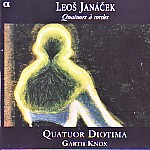This constant harping on the virtue of new editions has become quite tiresome. The need to go back and re-examine well-known masterpieces and exaggerate the value of textural minutiae has become an epidemic, largely motivated by the need of music publishers to keep popular works in copyright, the better to subsidize the reams of junk they issue by modern composers no one cares about. Janácek’s Second Quartet always has been the subject of editorial controversy, but these issues are best solved by individual artists within the context of specific performances, with the results being left to speak for themselves, rather than (as here) by a dogmatic assertion that the “right” text is finally being used for the first time.
The Diotima Quartet turns in passionate, spontaneous, and highly idiomatic performances of both works irrespective of the editions being used. Misjudgments are few and far between: the opening of the Second quartet’s finale, with its accompaniment now played pizzicato, would have benefited from a slightly livelier basic tempo. Similarly, the finale of the First quartet surges to a climax just a bit too early, the accompaniment overpowering the principal voices, making the return of the work’s opening idea less powerful than it should be. In the very soft playing at the opening of the same work’s third and fourth movements, the group sometimes tries too hard to produce a ghostly sonority, with some cost in steadiness of tone.
Where the group excels, as in the café music with sinister ponticello interruptions in the First quartet’s second movement, or in the explosive eruption in the third movement of “Intimate Letters”, it’s simply because they are playing their collective hearts out and reacting spontaneously to the music’s superheated emotionalism, edition be damned. As I said previously, the general impression these performances make is extremely positive: my reservations really only come into play if you have the reference versions listed above or a few others (one of the Talich Quartet recordings, for instance, or the recent Skampa Quartet also on Supraphon). These have just that much more spontaneity and technical finish.
Finally, it’s well known that Janácek originally composed the Second quartet for viola d’amore in place of the usual viola, but the idea was later scrapped for practical reasons. Just because an excellent player like Garth Knox is around who can actually play the original part doesn’t mean that it’s valid to restore what the composer ultimately rejected. This is misplaced scholarship, and it smacks of gimmickry. How is the character of the work changed significantly by the presence of the viola d’amore’s marginally softer timbre? If Janácek had suggested playing the work under water, would we have to hear it that way too? Enough already! I know this sounds grouchy, but the “new critical edition” hoopla merely diverts attention from much fine quartet playing. Happily, I can recommend this release to collectors of these works on the basis of its musical quality alone. [3/5/2009]
































